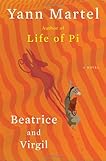 Beatrice and Virgil: A Novel by Yann Martel
Beatrice and Virgil: A Novel by Yann MartelMy rating: 5 of 5 stars
Let me start with the fact that I loved Life of Pi and I find Yann Martel's unique writing style to be very interesting. I enjoy the fact that he often leaves things open to interpretation and makes me think. But, I also understand that many do not like this aspect of Martel's writing. They prefer novels that are a bit more clean and resolved.
I'd heard very different things about this new novel, Beatrice and Virgil. Many people that I know and respect, loved it and others that I know and respect hated it. It appeared to be impacting people in very different ways. I did not read any reviews because I really wanted to experience the novel for myself and make my own determination.
In the end, I was quite taken with this little novel. It was like nothing I've ever read before. It was dark and twisted. It quite frankly took me on a journey, a journey that I will not forget.
The novel is ultimately about the Holocaust but Martel doesn't tackle this head on. He uses a number of literary devices to tell the story. I really found that this made the impact of the novel all the more interesting. As it was a completely new way to experience something that I've read a hundred books on and seen movies about, it's almost as if it awakened and deepened my understanding of the enormity of the tragedies of the Holocaust. It made me feel something new about a subject that I felt I was already quite aware of and impacted by. That was ultimately why I loved this book. It gave me a new perspective on something that I was already aware of and felt that I understood fairly well. After hearing about the atrocities of the Holocaust over and over in so many different forms throughout the years, it is as if I'd become numb in some way to the horror of it. This book took me to a different place about the same events and made me feel something/think about something in an entirely new way. In my mind, that is what makes this novel brilliant. That is why it stuck out to me so much. That is why I continue to be quite taken with Martel and his ability to make me see things in a new and different way.
I thought that the writing was wonderful and that there were moments of pure genius in the prose. The dialogue between Beatrice and Virgil was fabulous - imaginative and whimsical without being trite. And the dialogue between Henry and the taxidermist was what really blew me away. It's what ultimately hooked me into the story. I felt as if all of the sections between Henry and the taxidermist just sucked me in and made me more and more uncomfortable as the novel moved forward.
I feel that Martel did an excellent job of making the entire novel subtle and mysterious, leading me right into the 'twisted' ending. Which didn't bother me nearly as much as it had bothered a lot of other readers. I felt it all came together exactly as it should have. I wasn't surprised by the ending. Perplexed, maybe. Thoughtful, definitely. But, I wasn't angry, upset. Nor did I feel betrayed in any way (which I've read some readers have been).
In the end, I love how Martel made me think in a new way about something we've all heard about/read about over and over. Personally, I found that to be very impactful. I finished this book. Sat it down. And just sat and thought. I couldn't get the story out of my mind. I was amazed at how effectively Martel pulled it all together over the course of the novel. I was amazed at what Martel compelled me to think about. I was perplexed that so many others didn't LOVE this novel. (That still bothers me. I'm just not sure why my experience of the book was SO different from so many others).
I recently read a review of this book that really summed up my feelings about the novel and why I think it works so I thought I'd add it here.
"What Martel has done with Beatrice and Virgil is give readers a multi-layered and highly textured read that at first seems somewhat obtuse and disjointed. For audiences used to being spoon-fed information in comfortable, digestible servings it might appear there are large gaps in the narrative. However, what he has done is both gradually build a picture of the obsessive nature of the artist in his character of Henry and find a new way of telling the story of the Holocaust. While the play within the novel is the obvious parallel, with its depiction of innocents being persecuted for no reason save their differences, as we follow the trajectory of Henry's obsession with both the play and the taxidermist it feels like we are watching the ease with which we can become complicit in horrific events. For although all the clues are right in front of him, Henry fails to see the obvious with almost fatal consequences." - Richard Marcus, BLOGCRITICS.ORG
I understand why some are not fans of this novel but, for me, it was everything that I want in a good book - thought-provoking, interesting, and readable. It is the kind of book that will stick with me for some time.
View all my reviews >>

I just found your comment on my blog!! Thanks for directing me to yours! I'm so glad you enjoyed this book, I've read quite a few negative reviews from critics but positive reviews from bloggers. Thanks!!
ReplyDelete